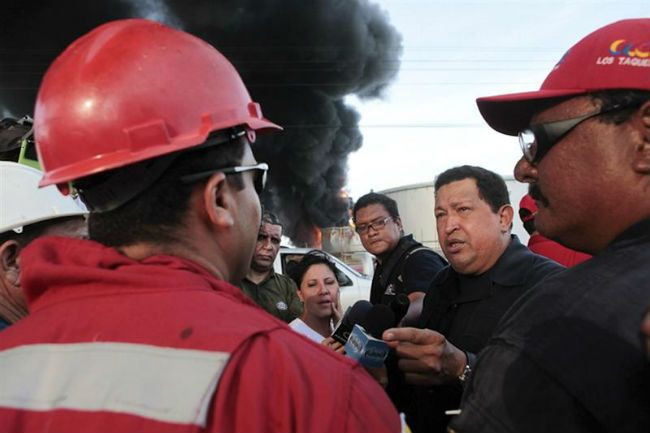
A huge fire burned for a third day in two fuel storage tanks at Venezuela's biggest refinery on Monday, putting in doubt plans to quickly restart the facility after one of the worst accidents to hit the global oil industry in decades.
The fire and the threat that Tropical Storm Isaac could disrupt refinery operations on the U.S. Gulf Coast and tighten fuel supplies helped push up U.S. fuel prices, with gasoline futures up about 3.15 percent at more than $3.17 a gallon.
The blaze at Venezuela's 645,000 barrel-per-day Amuay facility has put a spotlight on frequent accidents at state oil company PDVSA's facilities, and spurred accusations of mismanagement by the government of President Hugo Chavez.
A thick column of smoke blackened the horizon above the refinery as the tanks continued to burn. The effects of the blast were evident from flattened houses and piles of rubble in the surrounding area.
Officials say that if they fail to extinguish the blaze with foam, they will let it burn out by itself, which could take two or three days.
Energy Minister Rafael Ramirez told Reuters by telephone from the scene that fire crews had worked through the night and were continuing their efforts on Monday.
"The breeze is changing direction all the time so we have to move the firefighting crews to keep trying to extinguish the fire," Ramirez said. "Last night we had a fire truck trapped by the blaze, fortunately without any victims or damage. We will continue the same efforts today."
A gas leak caused an explosion and then a fire before dawn on Saturday at Amuay, part of the world's second biggest refinery complex. Nearby homes were obliterated, at least 48 people killed and dozens more wounded.
Residents complained of thieves taking advantage of the confusion and the evacuation of homes to loot from damaged houses and shops. Reuters witnesses saw people carrying boxes and food out of a ruined bakery.
"I couldn't sleep last night. The heat was worse because the wind shifted this way," said Jaime Valbuena, 18, who lives in the nearby La Pastora neighborhood. "And we can't leave either because people are stealing from houses."
Authorities have not said how victims will be compensated. In the meantime, PDVSA has sent vehicles to move residents and their belongings to safety, as well as providing food and water.
STARTUP SEEN SLOW
State oil company PDVSA says no production units were affected and that Venezuela has enough stocks to meet its commitments to the domestic market and keep up exports.
But traders remain skeptical of PDVSA's promises to restart the refinery within two days, and say the impact on fuel markets may continue even once Amuay is up and running.
Tank farm accidents often cause problems with gasoline blending, which means PDVSA may have to boost imports.
"Occurring at the world's second largest refinery complex at a time of heightened geopolitical strain and economic doubt, the outage ... will further tighten Atlantic Basin middle distillates," said JPMorgan in a research note.
Ramirez told Reuters that PDVSA is considering seeking floating storage in the area - using tankers to store oil and refined fuel offshore while the company repairs the main tanks.
The blast has added a sour note on President Hugo Chavez's reelection campaign, pulling him away from his usual schedule of exuberant rallies and ribbon-cutting ceremonies.
"There must be a serious and transparent investigation, out of respect for those who lost their lives," said opposition presidential candidate Henrique Capriles. "The state must assume its responsibility and give answers."
But the incident does not yet appear to be major issue for the October 7 election that polls broadly show him winning.
Neither Chavez's government nor PDVSA is likely to face legal fallout from regulators over potential safety violations because his allies closely control both the regulatory agencies and the justice system. PDVSA's frequent refinery incidents rarely draw sanctions from the environment or labor ministries.
That contrasts with what BP faced after the 2005 Texas City, Texas, refinery explosion, which killed 15 people in a case that pitted U.S. government regulators against private industry.
Chavez has furiously criticized insinuations that a gas leak had been going on for several days before the blast.
Union leader Ivan Freites of the Paraguana complex accused officials of playing down the scale of the disaster and said he has been pushing PDVSA to improve safety for years.
"This could have been avoided. They are trying to make it look like leaks are something normal, when there are lethal gas detectors in refineries ... and workers must carry detectors," Freites told Reuters.
Saturday's blast ranks as one of the most deadly oil industry accidents in recent history, nearing the toll of the 1997 fire at India's Visakhapatnam refinery that killed 56, and topping the 2005 Texas City refinery blast.
© Thomson Reuters.




